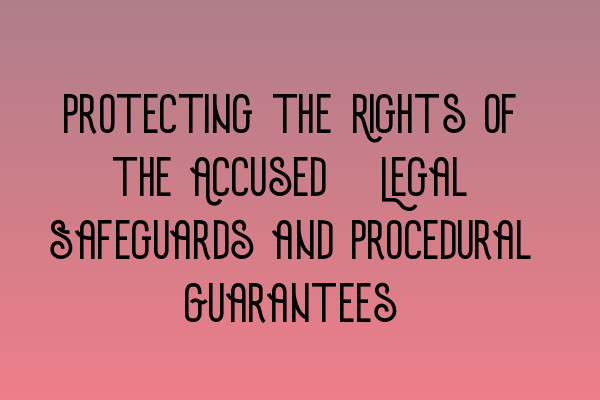Protecting the Rights of the Accused: Legal Safeguards and Procedural Guarantees

In the criminal justice system of the United Kingdom, it is vital to ensure that the rights of the accused are protected. Legal safeguards and procedural guarantees play a crucial role in safeguarding the fundamental rights of individuals accused of crimes. These safeguards and guarantees not only protect the accused from unfair treatment but also maintain the overall integrity and fairness of the criminal justice system.
The concept of “innocent until proven guilty” forms the foundation of criminal law in the UK. The presumption of innocence places the burden of proof on the prosecution and ensures that the accused is not treated as guilty before the completion of a fair trial. Let’s explore some of the key legal safeguards and procedural guarantees that protect the rights of the accused.
1. Right to Legal Representation
The right to legal representation is a fundamental safeguard that ensures the accused receives proper legal advice, guidance, and representation throughout the criminal proceedings. It allows the accused to make informed decisions regarding their defense strategies, plea bargains, and appeals. Legal representation plays a vital role in balancing the power dynamics between the prosecution and the defense.
If you are looking to expand your expertise in criminal practice, workshops and seminars on criminal practice can provide you with valuable insights and updates related to legal representation and defense strategies.
2. Right to a Fair Trial
The right to a fair trial ensures that the accused is provided with an impartial tribunal, a competent legal judge, and an unbiased jury (if applicable). It guarantees that the proceedings are conducted in a transparent, ethical, and unbiased manner, allowing both the prosecution and the defense to present their case effectively.
To stay informed and prepared regarding updates in UK criminal laws, it is essential to regularly update your knowledge. Check out the articles on updates in UK criminal laws to enhance your understanding of fair trial rights and legal developments.
3. Right to Silence and Protection Against Self-Incrimination
The right to remain silent and protection against self-incrimination are crucial safeguards that prevent the accused from being compelled to provide evidence against themselves. This ensures that the accused cannot be forced to make statements that may be used against them in court. It offers protection from coerced confessions or testimonies and helps maintain the integrity of the trial process.
4. Right to Challenge Evidence and Witnesses
The accused has the right to challenge the evidence presented against them and cross-examine witnesses. This ensures the fairness and accuracy of the evidence and allows the defense to expose any inconsistencies, biases, or questionable practices during the investigation and trial. Effective cross-examination is a valuable skill that can significantly impact the outcome of a case.
For a detailed analysis and understanding of criminal evidence rules, check out the comprehensive article on decoding criminal evidence rules.
5. Right to a Speedy Trial
The right to a speedy trial ensures that the accused does not face unnecessary delays in the legal process. This safeguard aims to protect the accused’s rights to a fair and timely resolution of their case. Delays in the legal proceedings can adversely affect the accused’s ability to present an effective defense, lead to mental and emotional stress, impact their livelihood, and compromise the overall effectiveness of the criminal justice system.
6. Right to Appeal
The right to appeal enables the accused to challenge the verdict or sentence if they believe that an error or injustice has occurred during the trial. This safeguard ensures that if a mistake has been made, there is a mechanism in place to rectify it. The right to appeal provides an opportunity for a higher court to review the case and potentially reverse or amend the previous decision.
For a deep dive into fraud and financial crimes in the UK, check out the informative article on fraud and financial crimes.
The legal safeguards and procedural guarantees discussed here are essential to protect the rights of the accused and ensure fairness in the criminal justice system. They reflect the principles of justice and promote confidence in the legal system. As legal professionals, it is crucial to understand these safeguards and work diligently to uphold them.
If you are preparing for the SQE Criminal Law exam, enhancing your study group experience can be invaluable. Learn more about enhancing your SQE Criminal Law study group experience for effective preparation.
To stay updated on criminal law and practice in the UK, explore our website and subscribe to our newsletter for the latest insights and updates.
